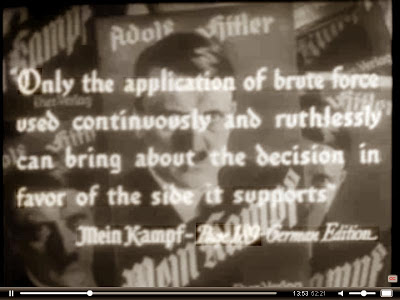The following appears in the U.S. Army’s 1943 series of propaganda-films, Why We Fight, at 13:52 in the episode titled Prelude to War.
It says:
“Only the application of brute force used continuously and ruthlessly can bring about the decision in favor of the side it supports”
Mein Kampf – Page 189 – German Edition
The purport of the alleged quote is that Adolf Hitler trusted only in brute force. Therewith it also implies a low regard for the importance of ideas and truth, and no inclination to abide by any principle. This alleged quote implies the entire portrait of Adolf Hitler that Why We Fight presents: that he is a brutal and opportunistic criminal, that he cannot be trusted, that he must therefore be destroyed through violent means.
It is curious that in this instance it was decided to reference the “German edition” of Mein Kampf, even though the sentence is not in German but in English. There was no obvious reason to do that, since two unexpurgated English translations were available as of 1941, one of them distinctly hostile to Hitler. The implication of presenting a sentence in English but referencing it to the German edition is that the information could not be found in an English edition, but that is on its face extremely unlikely.
We can find something resembling this alleged quote in the English translation published in 1941 by Reynal and Hitchcock. Words used in the alleged quote appear in red:
Every attempt at fighting a view of life by means of force will finally fail, unless the fight against it represents the form of an attack for the sake of a new spiritual direction. Only in the struggle of two views of life with each other can the weapon of brute force, used continuously and ruthlessly, bring about the decision in favor of the side it supports. [Adolf Hitler, Mein Kampf, tr. New School for Social Research, p. 223]
Notice what was left out: where Hitler used the qualifier, “in the struggle of two views of life with each other,” the film entirely omits this.
In the German edition of 1943, the corresponding passage does indeed appear on page 189:
Jeder Versuch, eine Weltanschauung mit Machtmitteln zu bekämpfen, scheitert am Ende, solange nicht der Kampf die Form des Angriffes für eine neue geistige Einstellung erhält. Nur im Ringen zweier Weltanschauungen miteinander vermag die Waffe der brutalen Gewalt, beharrlich und rücksichtslos eingesetzt, die Entscheidung für die von ihr unterstützte Seite herbeizuführen.[Adolf Hitler, Mein Kampf, ed. 1943, p. 189]
The Reynal and Hitchcock edition represents the meaning of this German passage accurately, so that referencing the German edition was unnecessary. Furthermore, the words in the film match the words in that translation closely enough that it is obvious that the Reynal and Hitchcock edition was in fact the source, here as elsewhere in Why We Fight.
Why, then, does Why We Fight in this instance reference a page number in the German edition when a widely available English translation says the same? Most likely this was done so that it would be very difficult for Americans having seen the film to check the accuracy of the quote. It is not even close to being accurate.
Through selective omission of words Hitler is represented as saying very nearly the opposite of what he did say. Adolf Hitler was not saying that ruthless use of force was the key to everything. What he said — read it for yourself — was that force by itself was ultimately impotent, that force could only prevail if it were employed in service to an idea (or geistliche Einstellung, spiritual orientation). The lack of any such idea was, he said, the reason why attempts to combat Marxism with force alone had failed. Far from being contemptuous of the idea, Hitler insists on it.*
_________________________
* The false view of Adolf Hitler as contemptuous of thinking and ideas was so successfully propagated that Friedrich Hayek, an ideological enemy of National-Socialism, felt compelled to begin chapter 12 of his 1944 book The Road to Serfdom with these words: “It is a common mistake to regard National Socialism as a mere revolt against reason, an irrational movement without intellectual background.” (Hayek, The Road to Serfdom) This view of National-Socialism was not some random “common mistake”; it was a lie deliberately propagated, and unfortunately still widely believed today.
